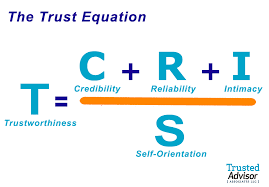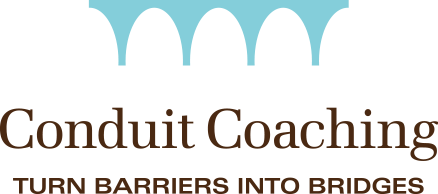Trust. It’s been popping up a lot in my world lately.
Yes, it’s a foundational topic in the Compassionate Leadership Academy.
But I’ve noticed it (or more accurately the lack of it) in other places too, like . . .
- A fractious senior leadership team, all of them scared, defensive and worried about each other’s opinions.
- Teams who treat clients and suppliers well, but each other? Not so much.
These situations bear out what research shows.
Low trust leads to less knowledge sharing, lower engagement, and higher job stress AND negatively impacts individual and team performance.
Ugh.
Trust Turnaround Solution
Leaders I’ve supported over the years who are super skillful at building trust have been empathy virtuosos. They naturally attune to other people’s perspectives, attitudes, and beliefs.
And yup, the trust built makes wonderful things happen.
 Turns out these trust wizards are modeling The Trust Equation created by the clever folks at Trusted Advisor.
Turns out these trust wizards are modeling The Trust Equation created by the clever folks at Trusted Advisor.
A few terrific things about this formula:
• It’s not a fairy tale. It’s been validated with a 72,000-person survey.
• It turns a nice-but-fuzzy idea into distinct measurable elements.
• It provides a roadmap for becoming more trustworthy.
Fundamental Factors.
The Trust Equation tells us that trustworthiness (how much others will trust you) comes from four factors.
First:
• Credibility. You know what you’re talking about.
• Reliability. You do what you say you’re going to do.
These two sound important, right? Except, um, well . . . they’re not.
Research indicates credibility and reliability are the least important of the four trust determinants.
Hmmm.
The most important factor? Intimacy, meaning others feel psychologically safe when interacting with you. People sense they can be vulnerable and not judged. That you’ll respect whatever they share with you.
In the Trust Equation, the higher these first three values, the more others will trust you.
It’s Not about You (shocking as that may be).
What shrinks trust?
Self-Orientation, that is, others’ perceptions of whether your focus is on them or you.
- If you’re focused on getting what you want, this number goes up, and trustworthiness goes down.
- But if you’re oriented toward others, curious about what they think, what’s important to them (in other words, if people feel like you care about them), your trust factor goes up.
 BTW, bonus points if you recognised this ‘caring for others’ thing as Compassionate Leadership!
BTW, bonus points if you recognised this ‘caring for others’ thing as Compassionate Leadership!
No wonder research shows Compassionate Leadership makes all sorts of good things possible.
Ok, but How?
I suspect if you’ve read this far, you’ve already got Credibility and Reliability dialed in. You’re probably a learner, keen to keep improving. Which means working on Intimacy and Self-Orientation may be your path forward.
Here’s four ideas, in increasing levels of difficulty, to help boost both of those factors.
Easy:
• When you’re talking to somebody, get off devices and email, and direct your attention to them.
 Medium:
Medium:
• Get curious and listen more. Listening gets you out of fix-it mode, boosts your empathy, and promotes problem-solving.
Not so easy, but totally worth the effort:
• Take a little emotional risk. Be candid. Practice situational humility.
• Reflect on your strongest relationships. Notice what’s made it easy for you to be vulnerable, for intimacy to flourish. Then, experiment with those strategies in one or more relationships that could benefit from stronger trust . . . and see what works!
Yes you can.
And for those teams I mentioned a few paragraphs ago who want more respect from their colleagues?
Two teams, independently (!), decided the key to respectfully making difficult requests was first focusing on the other person by pausing and looking them in the eye, then explaining why they needed help, and, finally, making the ask.
Since I’d never taught these folks about the Trust Equation, their conclusions have me thinking that with time, opportunity and reflection . . . we intuitively know this stuff.
I’m thinking the tough part is having the wisdom and courage to take action, even when we’re feeling stressed or a little afraid.
So? Can you do it?
I’m pretty sure you can. You’ve got this.
Especially for Leaders & Teams in Seniors Care.
I see low trust in Seniors Care when front-line staff treat residents and families well, but each other? Not so much. And it costs. Not just with staff turn-over/low retention. But also in the quality of care residents receive. Not good.
Giving your teams the time and opportunity to connect and learn more about each other . . . that builds intimacy. It also helps them see and accept each other as mere mortals who sometimes mess up . . . which lowers self-orientation.
No, it’s not a quick fix. Being trustworthy and building trust within your teams aren’t one-and-done vital leadership skills or easy to master.
That’s why, a big part of the Seniors Care Leadership Academy, has us dig into the details and practice of building trust.






